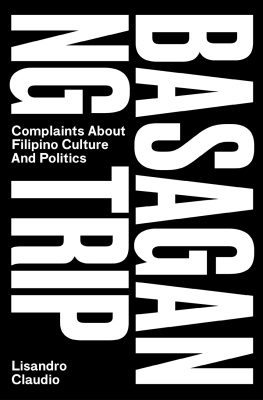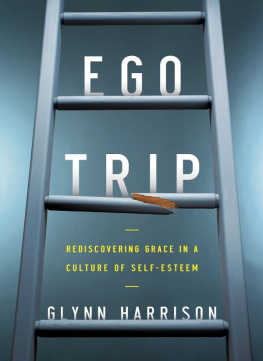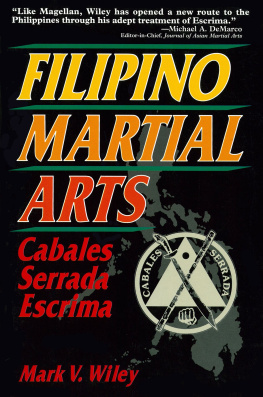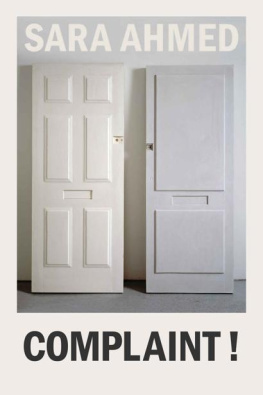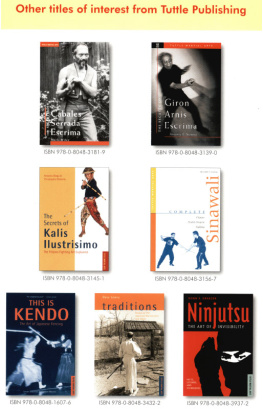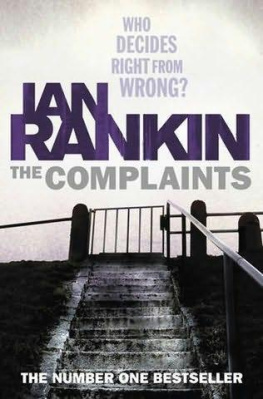Basagan ng Trip: Complaints about Filipino Culture and Politics
by Lisandro E. Claudio
Copyright to this digital edition 2016 by Anvil Publishing, Inc. and Lisandro E. Claudio
All rights reserved. No part of this book may be reproduced or distributed in any
form or by any means, or stored in a database or retrieval system, without prior
written permission except in the case of brief quotations embodied in critical
articles and reviews.
Published and exclusively distributed by
ANVIL PUBLISHING, INC.
7th Floor Quad Alpha Centrum
125 Pioneer Street, Mandaluyong City
1550 Philippines
Trunk Lines: (+632) 477-4752, 477-4755 to 57
Sales & Marketing:
Fax: (+632) 747-1622
www.anvilpublishing.com
Book design by Kristian Henson (cover) and Ani V. Hablan (interior)
ISBN 9789712733482 (e-book)
Version 1.0.1
Contents
Part 1
Pedagogic pedantry or
Reflections from the classroom and archive
Part 2
Lives on the Left or
Stories from Fukuyamas ended history
Part 3
Pop and politics or
The high/low of pretense
FameIm Gonna Live Forever:
An interview with Kris Aquino
Part 4
Sex and Secularism
or Attempts to terrorize the Catholic church
Part 5
Notes on language, thinking, and the media
or Stabs at intellectual snobbery
Part 6
Present-ing the Past
or Publicizing my historians task
Refragmenting EDSA: Supplications and
insults for the nationalist baby boomer
An American red state and Latinized banana republic
in Asia: Humoring the Philippine nation-state
WALANG BASAGAN NG trip, is one of the vilest phrases in colloquial Tagalog, reflecting a long anti-critic tradition in Philippine arts. When artists, especially musicians, use the term, they are asking critical voices to shut up and smile: Dont criticize my work (my trip); were all just trying to be happy here. Shouldnt art, after all, be fun?
Trawl through meme-able websites and youll get similar catchphrases like stop complaining and start creating or those who cant do, criticize. One Filipino creative writer once told a petulant girl that she should stop bitching and just start writing (as if bitching cant be done with wit and humor, i.e. creatively).
I cannot do things. I was tone-deaf until eighteen, my spatial reasoning is so weak as to preclude me from folding the most basic origami, all the photos on my Instagram feed are poorly lit, and my inability to describe imagery (as you, dear reader, shall see) walls off the world of fiction and poetry. (There was this one time when my penmanship held an allure for a friend with an interest in typography. But it was only because my chicken scratch was so ugly she thought it could be the basis for an ironic font.) In high school, I used to get Bs in art class, which was essentially the average of the Ds I got for application exercises and the As I got for my essays.
So being a critic and essayist was, one could say, my only means of self-expression. Indeed, I cannot create, so I just complain. Ive made some complaints that have offended many (declaring OPM dead) and Ive made some more popular ones (calling out Tito Sotto for being sexist). And yes, I am proud to call them complaints, because complainers believe that things are wrong and can be changed.
Welcome to the world of the second-class citizen in the republic of arts and lettersthe much-maligned tagabasag ng trip.
THE polemical essay is the critics best tool. Since we cannot evoke in the way artists can, we provoke instead. But this process is itself an art. George Orwell was one of the most vicious polemicists of the twentieth century, but his goal was to turn his argumentative writing into an art. Ive never figured out what he meant by the statement, because the sparseness of his writing may give people cause to label it (incorrectly) prosaic. But to me, the art of the polemic has always manifested in the composition. The process is about grappling with ones emotionality: I could cum on the page the way Pollock came on the canvas, or I could bullshit you like Duchamp because I was/am a prick. Or my anger could incarnate as didacticism the way it does with Filipino social realists (ah, for we can only represent the proletariat by making them boring).
The whole issue is one of maturity. That critics shoot their mouths is a given. That critics take full responsibility is not. That critics, especially ones with social commitments, get angry is also a given. That critics canalize (Christopher Hitchens metaphor) this anger into lucid prose is not. But this doesnt mean we shouldnt shoot our mouths, or that we should give up our anger.
Since polemics are aimed at generating controversy, those who write them should hold themselves up to a higher bar of maturity. Hence the essays here are my attempts at maturity and responsibility. Insofar as they reflect a coming of age story for a millennial (a grotesque term that I have accepted as a necessity), its a story in pieces.
They are pieces because they are short pieces, mostly columns from GMA News and long-form profiles for glossy monthlies (the longest ones are from my pet project, The Manila Review). They are pieces also because they are fractured, impressionistic descriptions, some of which are more coherent than others. As an academic historian, I felt more authoritative writing the essays related to my research: the Philippine Left and postwar intellectual history. The provisional frivolities, however, were more enjoyable: from a melancholic attempt to argue that the Erasherheads were the last great Pinoy band, to a tribute to sentimental showbands like Side A, to a profile of Kris Aquinos beauty regimen.
The variety of topics reflects the classic claim to authority of the modern critic: I can blend high and low, serious and frivolous. Its a pretensions fait accompli for which I request forgiveness.
There remains, however, some sincerity here, namely the belief that the diversity of political and artistic topics that can interest the contemporary Filipino reader is wide. That wide canvas indicates that a lover of words in the Philippines has much to celebrate, perhaps now more than ever. Yet that same wide canvas also reminds us that there are, alas, many things to complain about. Many trips to be broken, but newer routes to build.
Kyoto and Quezon City, 2015

